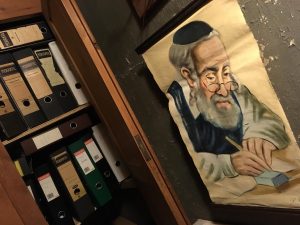
Author: Ruth Illman
Vernacular religion can be described as a triangle of being, knowing and doing, kept together by continuity, change and context. Exploring how this dynamic works is the goal of an ongoing research project at Åbo Akademi University mapping everyday Jewish life in Finland today.
Vernacular religion is drawing a growing interest worldwide today. Traditionally, religions have been described from the perspective of “being” e.g. Jewish, Christian or Muslim and “knowing” the central teachings and traditions of the religion. But when focusing on religion as an aspect of ordinary people’s everyday life, we must also look at how it is “done”. Our focus on fuzzy day-to-day life turns the spotlight from stable, monolithic entities of identity on to the unfinished, evolving processes of identification. We focus on how it feels, smells, tastes and sounds to “do” religion, accounted by mainstream believers as well as the deeply engaged and the thoroughly indifferent.
The first question that arises is: why is that important? How can the small and peripheral Jewish community of Finland offer relevant information illuminating the globally overarching questions of religion and change? What can this miniscule minority offer to the research on global Jewry?
We argue that the case of Finland is relevant due to its exceptional character, which is both unique and representative of general patterns. Finland is one of the few countries with a surviving East European Jewish community post-Holocaust. It is also one of the world’s most secularised countries. The two Jewish communities of Finland (Helsinki and Turku) have approximately 1,300 members but the number of Jews living in Finland today is estimated to be larger. Among these, the number of converts and mixed marriages is remarkably high (even 95%) but the community remains officially orthodox and strives to preserve a markedly Finnish-Jewish identity. Thus, its profile is quite unique: it is rooted in and still defined as an Orthodox community, but a large part of the members hold progressive or secular worldviews and distinctly plural religious identifications. The rapidly increasing diversity of Finland is also reflected in the Jewish community where the blend of cultures, languages and religious views is colourful. However, due to the small size of the community it is possible to generate a comprehensive understanding of the identity processes at work in it.

Focus on food, family and feasts
The project engages five researchers: MA Mercédesz Czimbalmos, docent Ruth Illman, docent Simo Muir, Dr Dóra Pataricza and Dr Riikka Tuori. It is structured around four case studies designed to capture general trends in vernacular religion: foodways, family life, customs, and relations to secular society. The data consists of archival material from official and family archives and in-depth interviews. We will soon have a rich, partly messy but highly relevant and exciting material at our hands – painting a picture of Jewish everyday life in Finland today in many colours.
Vernacular religion is an outlook that is, so to say, both “bottom-up” and “top-down” at the same time. It emphasises the continuous dialogue between personal narratives and socio-religious structures. Vernacular religion is also far from monolithic, changed and formed by an abundance of trivial and crucial choices relating to everyday life, which are not made solely on religious grounds but also driven by economic and social circumstances, habits and chance. For a Jew in Finland, choices are often scarce: there is just one community, kosher food is scant and often expensive, potential partners may be hard to find within the small and tight-knit community. It is out of such mundane but monumental elements that vernacular Judaism is built: you simply make the best of the situation, choosing how you “do Jewish” within the frames of what’s possible.
This blog post is part of the Minority Studies series authored and facilitated by researchers from the Åbo Akademi Minority Research profile.
References:
Boundaries of Jewish Identities in Contemporary Finland – project website.










